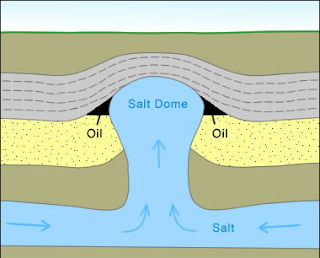Introduction
Have you
heard of an under-the-sea lagoon or lake? There are many instances of these
reported by geologists. However, many of them are habitable one like their
surroundings on the sea bed. There is an odd one out in this category. The
Scientists who discovered it have decided to call it as Jacuzzi of
Despair. This odd lagoon is totally inhospitable to life. No living marine
organism has come out of it alive. This under-sea lake is found nearly 3,300
feet below the surface of the Gulf of Mexico. In this blog, we will be looking
at the peculiarities of this under-sea lake.
Jacuzzi
of Despair
If we
look at the under-sea lake, the name given by the Scientists look apt and
self-revealing. They have found that the walls enclosing this lake hold a toxic
concoction of extra-salty brine and gases. The gases that come out through this
dense brine solution are methane and hydrogen sulfide. Hence, the creatures
that inadvertently fall into this salt-rich pool of water become dead in no
time. It was found by a group of Scientists under the stewardship of Erick
Codes, who is an Associate Professor of Biology at Temple University. The group
has published its findings in the reputed journal Oceanography.
Origin of
Under-sea Lagoon
According
to Erick, the underwater explorers can find these types of formations at
various places on the sea bed. For them, these formations present themselves as
a lake or a river flowing. According to the team of researchers, this pool or
lake came into being when seawater seeped into the fissures on the ocean floor.
The seawater mixing with the subsurface salt resulted in a hot extra-saline
liquid. This liquid was later pushed back to the surface by the gases such as
methane and hydrogen sulfide. The water
in this lake is at least 4-5 times saltier than the water that surrounds it.
Being so dense, this extra-strong brine stayed at the bottom forming the lake.
In fact, it is a percolating bowl of toxic chemicals, including methane and
hydrogen sulfide.
Significance
of this Discovery
Though
rare, the underwater adventurers have found brine pools like this before. What
makes this brine pool looks different is the existence of rich ecosystems on
its edges. According to Erick, the group was able to find mussels with
symbiotic bacteria living in one such colony along the periphery of this pool.
This colony was feeding on the hydrogen sulfide and methane gases to stay
alive. Near the pool, the group was able to find specially adapted shrimps and
tube worms as well. These creatures are living in highly saline and no oxygen
environment. According to Erick, the study on this type of ecosystem provides
hints about the living conditions of those creatures that might be found on
planets in our solar system or even beyond. At present, different research groups
are using these extreme habitats on earth as models for what we might discover
in other extra-terrestrial systems.









0 Post a Comment:
Post a Comment